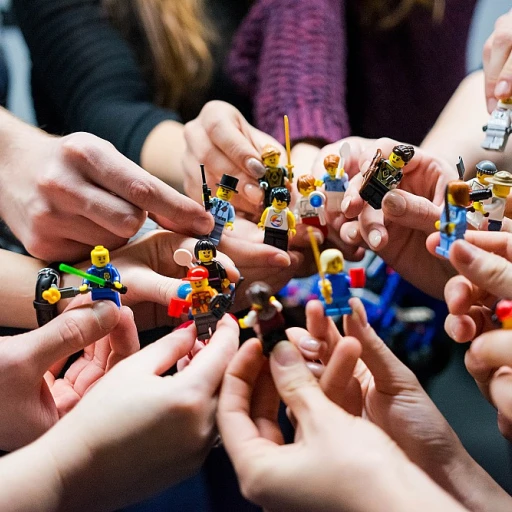
Understanding the Role of Mreach Mentees
The Critical Role of Key Career Catalysts
Understanding the role of Mreach Mentees is pivotal in unlocking the potential of high potential employees. These individuals are often considered the future leaders within organizations, making their early career development essential for long term success. The rise program, focusing on high potential employees, offers incredible opportunities to nurture their growth. Mreach Mentees serve as vital links between mentors and professional development activities. The mentorship program is designed to help mentees develop through a structured framework that includes ongoing support and development opportunities. Mentorships are crafted to foster both professional and personal growth, setting clear goals for mentees to rise within their careers. A successful mentor mentee relationship is built on trust, respect, and consistent communication, which are at the core of every effective mentoring program. It enables mentees to reach their full potential by exposing them to new perspectives and ideas. As mentors guide their mentees through complex career paths, they provide invaluable insights that strengthen professional bonds and improve work relationships. For those involved in mentoring relationships, it is crucial to set aside dedicated time for these engagements. Regular meetings allow mentees mentors to align on goals and track progress, ensuring that both parties are aware of the expectations and the outcomes achieved. While tackling challenges is an integral part of any professional journey, having a supportive mentor can markedly enhance a mentee's ability to overcome obstacles. High potential employees can greatly benefit by engaging with senior leaders and exploring career development opportunities. To further assist those in mentoring programs, consider delving into engaging questions to ask senior leaders, which can provide nuanced guidance and foster open dialogues in any mentor relationship.Identifying High Potential Employees
Recognizing Potential in Early Career Professionals
Identifying high potential employees within the reach rise programs is essential for fostering growth and achieving long-term success. High potential individuals, often referred to as HiPos, usually exhibit distinct traits and capabilities that set them apart from their peers. Understanding these qualities can greatly assist mentors and organizations in nurturing talent. Traits of High Potential Employees High potential employees demonstrate a strong ability to handle complex work assignments and adapt quickly to new environments. Key traits include:- Career Development Aims: A keen focus on professional development and eagerness to engage in learning opportunities.
- Leadership Potential: An innate capability to lead and mentor peers, often volunteering for extra responsibilities during mentoring relationships.
- Goal-Oriented: A clear vision for achieving professional goals and demonstrating the drive to reach them.
- Adaptive Thinking: Flexibility and creativity in problem-solving, crucial for climbing the career ladder.
- Emotional Intelligence: High emotional and mental health awareness, fostering strong professional relationships and a positive work environment.
Challenges Faced by Mreach Mentees
Overcoming Barriers for Mreach Mentees
The journey of a Mreach Mentee can be riddled with various challenges. Navigating through these hurdles is vital for their growth and success in any mentorship program. Mentees often juggle numerous responsibilities that can pose challenges, from professional development to maintaining a healthy work-life balance.
- Time Management: Balancing meetings with mentors while managing day-to-day tasks is a common struggle. Effective time management skills are crucial to ensure that neither the mentorship relationship nor job duties suffer.
- Building Strong Relationships: Establishing a productive mentor-mentee relationship can be difficult if there's a lack of communication or trust. A successful mentoring relationship requires open lines of communication and a mutual understanding of goals and expectations.
- Professional Development: Mentees often face a lack of clarity in their career development. This can hinder their ability to set long-term goals and objectives. Professional development programs can provide the necessary direction and support.
- Mental Health: The pressure to perform and meet set expectations can take a toll on the mental health of a mentee. Organizations need to acknowledge and support mental health initiatives to ensure the well-being of their mentees.
Despite these challenges, the right strategies and support system can empower Mreach Mentees to excel. By leveraging mentorship relationships and resources such as the Enhancing Skills Through Performance Management Training, they can overcome obstacles and reach their potential. It's crucial for mentors to recognize these challenges and offer guidance and empathy, helping mentees rise to new heights in their careers. By addressing these hurdles, the mentoring program not only fosters growth but also strengthens the overall organizational framework.
Mentorship and Its Impact
The Transformative Power of Mentorship
Mentorship plays a pivotal role in shaping the career trajectories of Mreach mentees. A well-structured mentoring program can provide the guidance and support necessary for mentees to navigate the complexities of their early career stages. The mentor-mentee relationship is a cornerstone of professional development, offering a unique opportunity for mentees to gain insights from experienced professionals.
Effective mentoring relationships are built on mutual trust and respect. Mentors act as guides, helping mentees set realistic goals and providing feedback that fosters growth. This relationship is not just about imparting knowledge; it’s about creating a supportive environment where mentees feel empowered to reach their full potential.
Building Strong Mentor-Mentee Relationships
For mentorship to be effective, both mentors and mentees must invest time and effort into the relationship. Regular meetings and open communication are essential to ensure that both parties are aligned in their objectives. Mentors should be approachable and willing to share their experiences, while mentees should be proactive in seeking advice and feedback.
Mentorship programs often include structured activities that facilitate professional development. These programs can help mentees develop critical skills, enhance their mental health, and prepare for long-term career success. By participating in these programs, mentees can build a network of professional relationships that will support their career development.
Impact on Career Development
The impact of mentorship on career development cannot be overstated. Mentees who engage in meaningful mentoring relationships are more likely to achieve their career goals and rise within their organizations. The support and guidance provided by mentors can help mentees overcome challenges and seize opportunities for advancement.
Ultimately, the success of a mentoring program depends on the commitment of both mentors and mentees. By fostering a culture of continuous learning and development, organizations can ensure that their high potential employees are well-equipped to contribute to the workforce and achieve their professional aspirations.
Strategies for Success
Strategies to Enhance Mentor-Mentee Success
A well-structured mentoring program can significantly boost the success rate of high potential employees, or Mreach mentees, within an organization. Here are actionable strategies to nurture a thriving mentorship:- Set Clear Goals: From the onset, it's essential that both the mentor and mentee establish clear goals. This mutual understanding guides the mentoring relationship and ensures alignment with career development objectives.
- Regular Meetings and Open Communication: Consistent interaction is crucial for mentoring programs. Schedule regular meetings to discuss progress, challenges, and new insights. This not only strengthens the mentor-mentee relationship but also provides a framework for professional development.
- Encourage Flexibility: Adaptability can make a significant difference in mentorship. Mentors should be open to modifying their approach based on the evolving needs and context of their mentees. This adaptable mindset ensures that the program remains relevant and effective over time.
- Emphasize Long-term Relationship Building: For mentorship to be truly beneficial, relationships should extend beyond the immediate goals. Creating a supportive network can provide ongoing support and encouragement, fostering mental health and confidence.
- Leverage Resources and Opportunities: Mentees should be encouraged to leverage available resources, such as training sessions or workshops, which can broaden their career perspective. Facilitating access to these opportunities illustrates the value of reaching rise through continuous learning.
The Future of Mreach Mentees in the Workforce
Shaping Future Leaders for Tomorrow's Challenges
The future for Mreach mentees within the workforce is promising, given the right conditions and support structures. As businesses continuously evolve, the importance of developing high potential employees through mentoring programs will remain pivotal. Companies are recognizing the value of investing in such programs, which not only benefit the mentees but also contribute to a thriving work environment.- Long-Term Growth: Mentees who actively engage in their mentor mentee relationships often experience significant professional development. This growth helps them meet and surpass their career goals, aligning with long-term objectives of their organizations.
- The Role of Mentoring Programs: Mentors provide crucial support and guidance to rising professionals. These programs help inculcate essential skills, which are vital for mentees' journey towards leadership roles. They offer a platform for mentees to learn from those who have successfully navigated their career paths.
- Nurturing Mental Health: With the increased focus on mental health, a supportive mentoring relationship can offer a safe space for mentees to discuss and address work-related challenges. This relationship can improve their mental well-being, contributing to better performance and engagement at work.
- Cultivating Professional Relationships: Through consistent meeting schedules and goal-setting, mentees build valuable professional relationships. These relationships extend beyond the program, often leading to future collaboration opportunities and career development.













